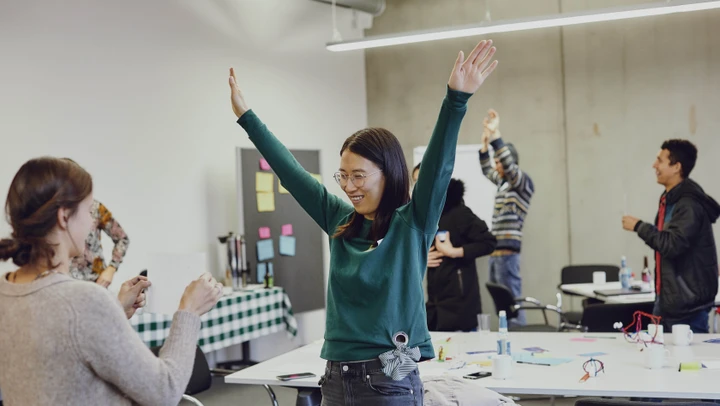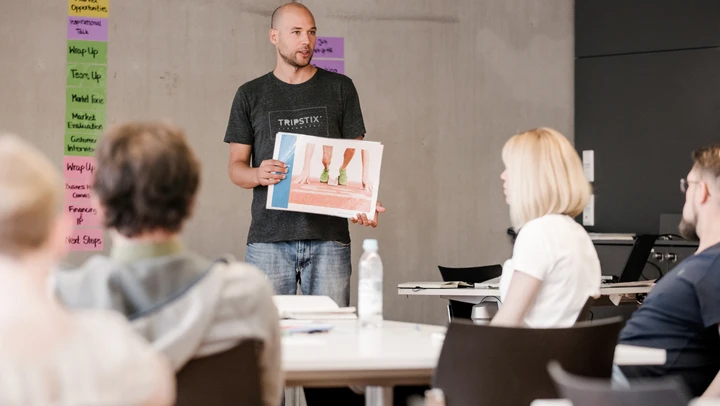
The continued use of a circular product as the norm: that is the mission of RE-SHIRT. Through its innovative reversible textile printing technology, the company aims to drive long-term change towards integrating sustainability into everyday life. We spoke with Anna Hadzelek and Emmy Schumacher about their innovation and the way from the first idea to their own start-up.
With RE-SHIRT, you want to move away from environmentally harmful mass-produced goods. What is your vision?
Our vision is to establish circular products in the field of printed shirts. Therefore, we have developed the first temporary textile printing technology for temporary needs - this allows us to offer printed shirts for rent to fairs, festivals or sporting events. We start where the gift T-shirt sadly lasts years in the back corner of the closet. For long-term needs, constant teams or even merchandise, we offer permanent printing on second-hand shirts. We are the first on the market with this as well - because it takes a few tricks and a good network to get hold of the many good shirts. In general, we want to show that good sustainability happens as a matter of course, is not restrictive, and does not mean sacrificing comfort or quality at any point.
How did you come up with the idea and what makes your innovation so unique?
It's unique because we are completely rethinking a fully established product. What's also special is that several factors lead to a particularly large environmental benefit: We don't start with individual consumption, it's always about larger quantities, and at the same time always about multiple use. The idea was a logical consequence of a personal feeling for resource protection on the one hand, and many years of working in the fashion industry on the other. In addition, there is the desire for new ideas, new products and processes, coupled with a certain inventive spirit.
It's always tricky to establish products that don't yet exist and that break with the consumer habits of the clientele.
Anna Hadzelek
What challenges did you face in planning and implementing your business idea?
It's always tricky to establish products that don't yet exist and that break with the consumer habits of the clientele - so the communication around RE-SHIRT is definitely a challenge. But a beautiful one! Absurdly, it is also not very easy to access the many second-hand shirts that exist unprinted all over the republic in sorting plants. However, there are great partners in this industry who share our motivation to conserve resources and are therefore also open to new approaches.
What milestones have you already mastered and where are you right now?
In 2021, we launched our two product lines, after technical and logistical lead-up. Another milestone is the funding from the Deutsche Bundesstiftung Umwelt (German Federal Foundation for the Environment), which of course gives our network development considerable tailwind. Now we're looking forward to the beginning of a festival season that will hopefully be a bit more reliable in terms of planning and more extensive than the last two, which were very pandemic.
What do you want to achieve in the near future?
Our company relies on a vibrant network of teams of all kinds on the one hand, and diverse collaborations on the other. We want to bring printers, sorters and laundries into efficient and fluid exchange and strengthen our collaboration. In addition, very roughly speaking, solid growth is on our to-do list.
How could UnternehmerTUM support you on your way?
Participating in the XPLORE Pre-Incubation Program was an important milestone for us on the way to our business model: it was a dense, inspired exchange of vivid resourceful people in similar situations. In addition, the MakerSpace was the discovery par excellence for prototyping.
Did you experience any particular hurdles as female founder compared to your male colleagues?
Nope, not really.
What advice would you give to aspiring founders?
First of all, something obvious: keep at it. Suddenly, and at times, you're working in a mode where no one wants anything from you, where there's no pressure from the outside, so to speak. At the same time, however, it's hard to keep track of what needs to be done on the inside, and it's often unclear where it's best to start. This is not always easy to bear. But what helps then, and what our second general tip is: talk. And preferably right from the start, even if the first impulse may be to keep the idea under wraps at first and protect it from criticism. Talking about the idea helps enormously, and criticism often takes you light years forward, even if it may hurt at first.
Thank you very much for the interview!
For more info, visit www.re-shirt.com or contact info@re-shirt.com.
























